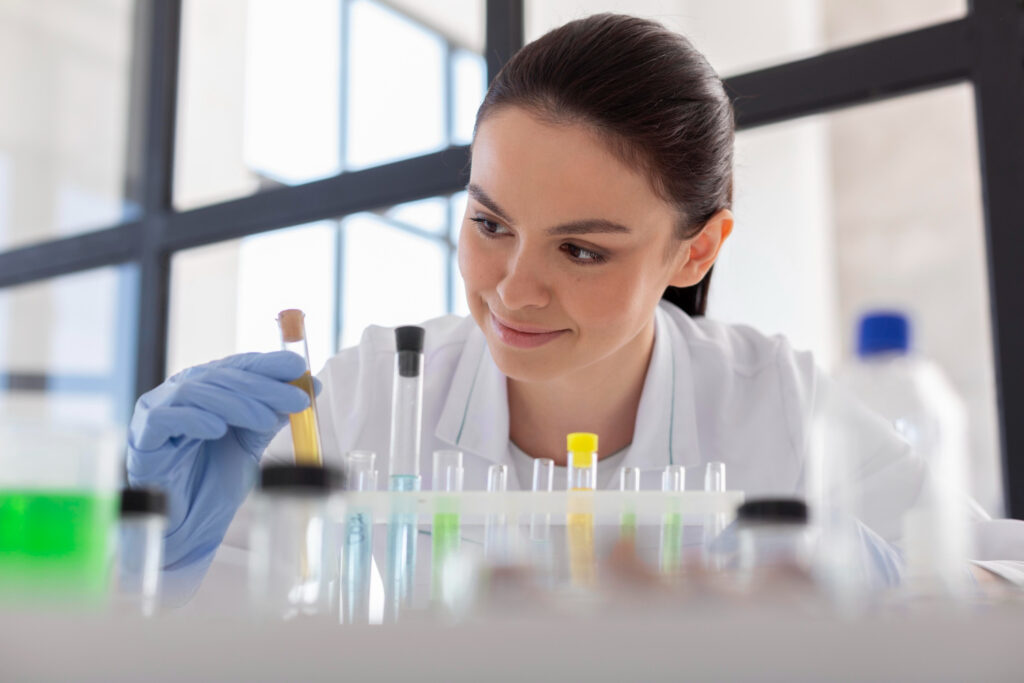L’Oréal-UNESCO award for innovative research in nanoscience

Proyecto galardonado por su enfoque en la reutilización de metales nobles para desarrollar sensores y catalizadores con bajo impacto ambiental.
The L’Oréal-UNESCO national award “For women in science” is one of the most prestigious prizes recognizing the scientific excellence of women around the world. In its 18th edition, the award honored researcher Paula C. Angelomé, who leads an innovative project focused on the reuse of noble metals for the creation of nanocatalysts and sensors. This breakthrough has the potential to transform industry through more sustainable and cost-effective methods.
The project that earned Paula Angelomé, a CONICET researcher, the award centers on the fabrication of nanoscale catalysts and sensors by reusing noble metal waste, particularly gold. This process is not only more efficient, but also more environmentally friendly. The research highlights how recycling gold nanoparticles—a limited and expensive resource—can be used to develop new technological solutions addressing global challenges.
Gold, a noble metal known for its exceptional chemical properties, is widely used in technological applications, especially in its nanoscale form. In this format, gold nanoparticles exhibit unique properties, such as the ability to change color depending on their size, making them extremely useful for developing sensors that detect pollutants, pathogens, and other biological molecules.
Through her work, Angelomé seeks to take advantage of waste from her own lab to obtain gold salts, which are then used to synthesize nanoparticles. These can be employed in the creation of efficient devices with applications in various fields such as catalysis, pollutant detection, and biomedicine.
Nanotechnology and sustainability: an innovative approach
One of the main challenges faced by modern science is finding more sustainable and eco-friendly methods to produce the materials that technology demands. In this context, Paula Angelomé’s research aims not only at the reuse of materials but also at the optimization of manufacturing processes. The use of nanoparticle waste to produce new catalysts and sensors not only reduces the amount of waste generated, but also minimizes dependence on non-renewable sources.
The methods developed in Angelomé’s project enable gold nanoparticles to be obtained from the nanowaste generated in her own experiments. This innovation has direct applications in industries such as chemistry and biomedicine, where the need for high-quality materials with a low environmental footprint is increasingly important.
The recycling process implemented by Angelomé addresses the growing demand for nanomaterials and the need to find more responsible ways of generating these resources. Sustainability is a central axis of this project, which not only seeks to reduce negative environmental impacts but also to improve the efficiency of nanomaterial production through the use of accessible reagents and simplified procedures.
The impact of the research and its future applications
Paula Angelomé’s research is not limited to the creation of recycled gold nanoparticles; it also opens new perspectives in the development of more efficient catalysts and sensors with industrial and medical applications. Catalysts made from recycled gold nanoparticles can improve industrial processes by making chemical reactions more efficient, while the sensors developed could offer fast and low-cost solutions for detecting contaminants and pathogens in high-demand environments, such as hospitals or research laboratories.
The potential to scale these processes at an industrial level is also one of the most promising aspects of Angelomé’s work, which could take these technologies beyond the lab and make them accessible to key industrial sectors, including the pharmaceutical and chemical industries that are seeking sustainable and affordable solutions.
This award not only brings visibility to the career of an exceptional scientist, but also underscores the importance of public-private collaboration for the development of scientific projects that address contemporary challenges such as sustainability and technological innovation.








